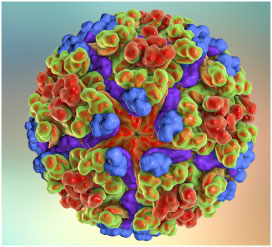
Error: No layouts found

Alphaviruses include important human pathogens such as encephalitic viruses and Chikungunya virus (CHIKV)—a mosquito-borne alphavirus that recently caused large epidemics worldwide, including in the Americas. In a study published online last December in PLOS Pathogens, Margaret Kielian, Ph.D., and Maria Gaudalupe Martinez, Ph.D., describe for the first time how alphavirus is transmitted from cell to cell during infection. Long cellular extensions from an infected cell contact uninfected neighboring cells and then release alphavirus particles, effectively shielding viruses from neutralizing host antibodies.
Drs. Martinez and Kielian found that the alphavirus structural proteins alone induce host cells to form these extensions, which preferentially target uninfected cells.
The findings could influence efforts now under way to develop vaccines against CHIKV. Dr. Kielian is a professor of cell biology and the Samuel H. Golding Chair in Microbiology. Dr. Martinez is an associate in the department of cell biology.